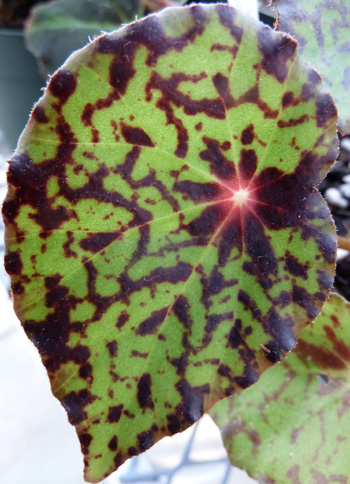Plants of the Week – January 16
 Regarded as the hardiest palm, Rhapidophyllum hystrix, or needle palm, is a small, shrubby palm averaging 4-6’ in height. Native to the southeastern United States, needle palms thrive on shady wooded slopes and moist forested bottomlands. Gardener Nicole Selby has planted R. hystrix within the protection of the Cosby Courtyard where it survived through the 2010-2011 winter. Check out the Jan.-Feb. 2012 issue of Green Scene magazine for additional information on hardy palms. Photo credit: J. Coceano
Regarded as the hardiest palm, Rhapidophyllum hystrix, or needle palm, is a small, shrubby palm averaging 4-6’ in height. Native to the southeastern United States, needle palms thrive on shady wooded slopes and moist forested bottomlands. Gardener Nicole Selby has planted R. hystrix within the protection of the Cosby Courtyard where it survived through the 2010-2011 winter. Check out the Jan.-Feb. 2012 issue of Green Scene magazine for additional information on hardy palms. Photo credit: J. Coceano
 Cornus alba ‘Bud’s Yellow’ is at its best during winter when the low, angled light of early morning or mid-afternoon illuminate the yellow stems. Site within a mixed border or in front of evergreens and provide full sun or partial shade. It is a rapid growing, multi-stemmed deciduous shrub generally reaching 5-7’ in height. Cut stems make attractive additions to winter containers or floral arrangements. Photo credit: J. Coceano
Cornus alba ‘Bud’s Yellow’ is at its best during winter when the low, angled light of early morning or mid-afternoon illuminate the yellow stems. Site within a mixed border or in front of evergreens and provide full sun or partial shade. It is a rapid growing, multi-stemmed deciduous shrub generally reaching 5-7’ in height. Cut stems make attractive additions to winter containers or floral arrangements. Photo credit: J. Coceano
 Euphorbia pseudograntii var. rubrum flourished in a dry, shallow planter in the Cosby Courtyard. Originating from tropical East Africa, E. pseudograntii var. rubrum grows 2-3’ in one season, ultimately reaching 6-8’ at maturity. Large, waxy, oblong leaves vary from pure green to solid maroon with varying degrees of color combinations in between. Provide full sun and sharp drainage. Photo credit: J. Coceano
Euphorbia pseudograntii var. rubrum flourished in a dry, shallow planter in the Cosby Courtyard. Originating from tropical East Africa, E. pseudograntii var. rubrum grows 2-3’ in one season, ultimately reaching 6-8’ at maturity. Large, waxy, oblong leaves vary from pure green to solid maroon with varying degrees of color combinations in between. Provide full sun and sharp drainage. Photo credit: J. Coceano
 With guidance from Bernie Wiener, Wister greenhouse volunteers learned tricks for successful begonia propagation. Among the cultivars propagated was Begonia ‘Red Planet’, a small-leaved rhizomatous begonia with leathery green leaves splashed with maroon markings and a red “planet” from which leaf veins originate. Begonia propagules will grow on in the greenhouse before moving outdoors and into containers. Photo credit: J. Coceano
With guidance from Bernie Wiener, Wister greenhouse volunteers learned tricks for successful begonia propagation. Among the cultivars propagated was Begonia ‘Red Planet’, a small-leaved rhizomatous begonia with leathery green leaves splashed with maroon markings and a red “planet” from which leaf veins originate. Begonia propagules will grow on in the greenhouse before moving outdoors and into containers. Photo credit: J. Coceano





No Comments